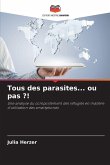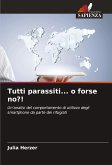According to official figures, over one million refugees arrived in Germany in 2015. At the height of the crisis in summer 2015, up to 10,000 people a day crossed the German border in search of rest, peace and prospects that were currently denied them in their home countries. Many of them ended up in Munich, Bavaria, and stayed. In the summer of 2016, the number of people reaching the Bavarian capital after a long and dangerous journey through Europe remains high, and there is no sign of a slowdown due to ongoing political instability in their countries of origin. Although the federal government preaches an open and warm welcome culture and most citizens are responding to this call with united efforts in the form of monetary and material donations and a great deal of voluntary work, there is also a lot of incomprehension and intolerance. This paper aims to provide insights into the flight of those affected and to generate understanding for the much-criticised use of smartphones before, during and after their journey to Germany.
Bitte wählen Sie Ihr Anliegen aus.
Rechnungen
Retourenschein anfordern
Bestellstatus
Storno








